Ellen and Jim Have a Blog, Too
We are two part-time academics. Ellen teaches in the English department and Jim in the IT program at George Mason University.


Pallisers, 5:9: "Time is pressing us very hard, Mr Finn" (1) · 10 March 08
Dear Harriet,
Another letter in my series of essays as letter-blogs on the 1974 BBC Palliser films.
Volume 5, Part 9 is one of the great parts of this series. We are in the heart of the Phineas matter now, and Raven and Trollope’s characters, their relationships, and the niches these presences occupy in their interrelated worlds have now reached the point of development that they are presented with depth and an array of complicated themes. 5:9 contrasts to 4:7 and 4:8: for the previous two parts of Phineas’s story, Raven had concentrated on political parties (meaning get-togethers as well as ideologies and groupings), bringing in the personal relationships of the characters as these impinge upon or are shaped by the political events of the moment; now he switches to concentrate on what has been happening in the domestic or private lives of the characters, and how familial, biological, and personal relationships intervene impinge on and shape public and political events.
My sense is Raven has done this not to make the contrasting emphasis, but because a TV program is one hour long and to make a coherent hour with meaningful juxtapositions he has to choose a kind of event and keep them close to analogous kinds. In a novel which is hundreds of pages and comes out in monthly instalments over a period of a year and one half, Trollope need only keep the three or four chapters a week a coherent unit.
This time I will write three separate letters, one on the intensities of the language and mise-en-scene, a thematic summary, and then a summary of the separate scenes in the episodes.
First, intensities of language and mise-en-scene: The story-line turns dark. Our hero continues to assert his altruistic political ideals and serious grave emotion: when Fitzgibbon (Neil Stacey) says to Phineas’s (Donal McCann) worry his pursuit of Violet Effingham (Mel Martin) will alienate Violet’s uncle, his patron, Lord Brentford (Lockwood West), Fitzgibbon says, “fancy her, do you,” Phineas replies with intense gravitas, “I love her, Laurence.”
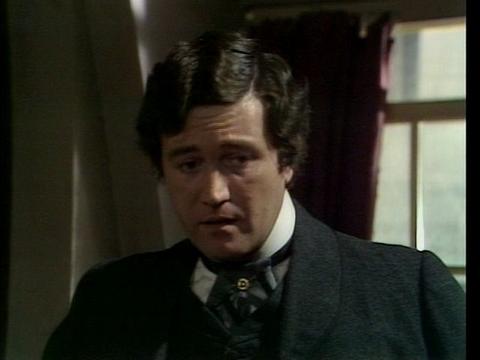
Phineas Finn (Donal McCann) asserting serious love for Violet
Nonetheless, the content of scene after scene shows he and now this and now that character to be duplicitious or at best merely Janus-faced, malacious, opportunistic, egoistic, indeed positively murderous towards the close of the hour. The high comic relief in one of the capital scenes of the hour is of Fitzgibbon’s unmarried sister, Aspasia Fitzgibbon (Rosalind Jones who plays the part with great panache) driving a hard bargain with Mr Clarkson (Sidney Bromley) apparently out of the uprightness of her heart sparing the dupe, Phineas, from having to go to prison now that Parliament is out of session and Fitzgibbon gone underground (hiding). This is the height of high-mindedness and cooperation that we see, and in terms of the Part (and life too), Aspasia’s act is angelic.
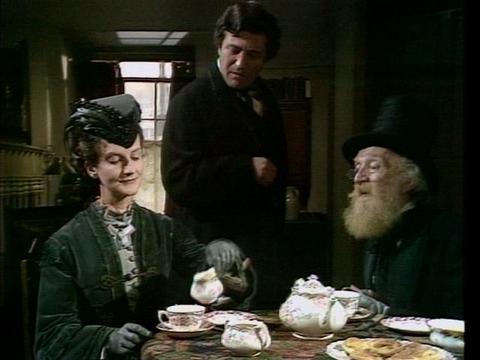
Phineas, Mr Clarkson (Sidney Bromley) and Aspasia Fitzgibbon (Rosalind Knight): she pours the tea before beginning negotiation
As the women characters did one of the high points of the Palliser (Philip Latham) and Lady Glen (Susan Hampshire) story, 2:3 (a continuum of women, splendours and miseries of courtesans), women dominate this part. Phineas ricochets from one to another, Lady Glen coming in as another as Phineas’s supporter’s wife who lives the life of a personally thwarted, exploited and overcontrolled breeder of heirs and party hostess.
That Raven is working at a level of genuine original intensity may be seen in the language patterns that emerge. This is a part where time presses everyone and the characters feel and articulate this. In the glorious opening scene, Violet tells Phineas in the first scene of the part (Episode One, “Violet and Finn”), where we see them on the high hill of Loughlinter, she is willing to get together with him “when chance dictates:”
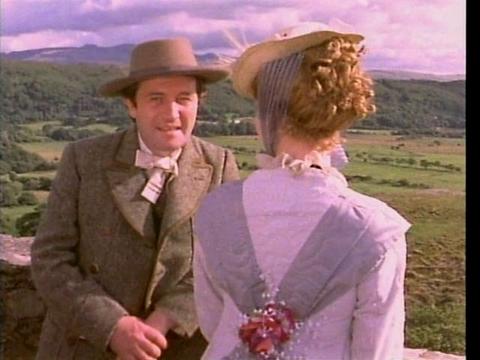
Phineas Finn & Violet Effingham on the heights
Now they must get back to the house lest they miss “grace”; in Phineas’s scene with Lady Laura Kennedy (Anna Massey) atop the same hill, we watch them talk and come together for a passionate embrace, while the camera reminds us Mr Kennedy (Derek Godfrey) is walking as fast as he can to meet them there:
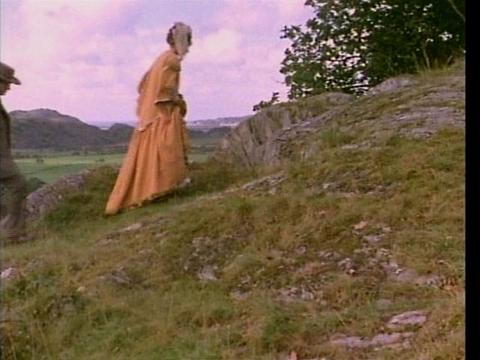
Phineas & Lady Laura Kennedy (Anna Massey): a symbolically slow & arduous climb up
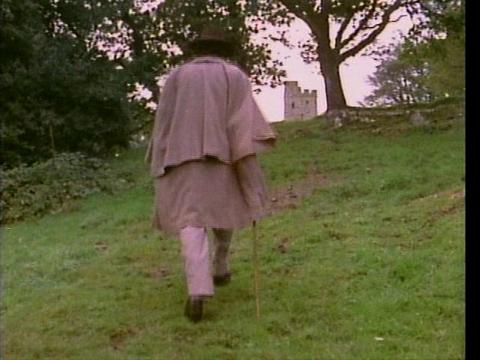
Robert Kennedy (Derek Godfrey) following after
And then it is time for the group at Loughlinter to leave Kennedy and Lady Laura alone and the problem is how she will endure all this time she must spend with him until she sees them again or returns to London.
It is Madame Max (Barbara Murray), the series’s second heroine, exemplary and to be admired for her courage, outlook, and abilities, who articulates the sense of time driving life. In the part’s second episode (“Payment Made”), Madame Max’s second scene, this one with Phineas, she is again playing the piano in her exquisitely feminine boudoir, and the stanza from the song chosen (from Herrick’s “Of daffodils”—nothing remotely like this in Trollope’s book) runs this way:
Stay, stay, until the hasting day has run
But to the evensong and having prayed together
We will go with you alone …”
Phineas cannot hear her urgent invitation. When he tells her of his longing for Violet Effingham and (perpetual worry in the part) he will offend Lord Brentford, she assumes an arch pose holding out his hat and cane to him, ushering him out with the words “give it time Mr Finn, to turn over”, he replies that what “presses” him is “time” for he must tell his friend and Brentford’s son that he means to pursue Violet now (he needs her money) before he goes off to try to be elected to the “family” seat. She then articulates the urgent note of the part: “Time is pressing us all very hard, Mr Finn.”
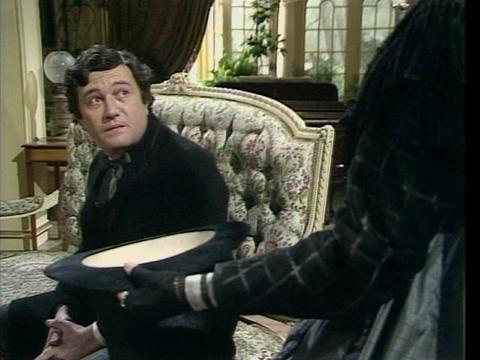
Madame Max (Barbara Murray) glimpsed holding out Phineas’ hat & cane
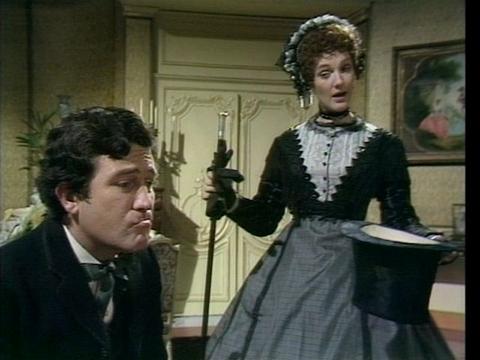
A pose of arch ever-so-slight mockery
On one level, it’s a local joke: she is expecting the Duke any moment now and wants to remove Phineas before the Duke comes (she does not manage that); but on another, the utterance captures why all the characters are so driven: they are feeling life flow out from them and the must grab while they may. Or they are caught, stuck. In the next scene Lady Glen’s advanced pregnancy is pressing in on her, leading to a hard quarrel between her and Palliser because she does not wants to live a life apart from these pregnancies, be free in spirit. Even Mr Clarkson’s joking demand, “Do be punctual” resonates here. In the next scene he threatens Phineas with the sheriff’s man (who “may be here soon”) if Phineas doesn’t pay now, and he means it (Aspasia, the unmarried woman who is not rich then turns up as this philandering man’s ironic dea ex machina).
Time, the imagery and movement of the episode swirls around nuanced varying references to time: Phineas reads of Lady Laura’s controlled misery in a letter as he is seen in a train being carried to the election:
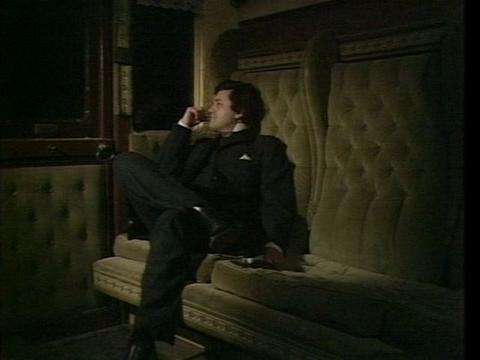
A Loughlinter time has brought forth Laura and Kennedy’s relationship; she desperately asked for time away from him (he will not give it, nor space as he longs for the sexual satisfactions she nonetheless manages to deny him); time has favored Phineas for the moment as he wins the election, but once he sends his letter to Chiltern telling of his plans, time presses on him to ask Violet to marry her as he must return to Ireland now Parliament’s. Before leaving Fitzgibbon tells him “the moment you kiss Violet Effingham you kiss goodbye to Brentford’s borough;” like “penny claret,” Brentford will turn “sour.”
“Well,” Phineas replies, “I’m afraid I shall have to raise the siege for the time being;” “While we’re in winter quarters in Killaloe,” Fitzgibbon replies (that is his return to Ireland). And so to Ireland & another beautifully pastoral scene, this time Phineas with Mary Flood (Maire Ni Ghrainne) ends with a code (his knee over her dress, them laying in the grace, her teasing he is trying to have “his wicked ways” with her and what will his London friends say when they find out) or visual scene he makes himself Mary’s lover: in time she will get pregnant and time will make him have to act right by her or not, both choices having consequences.
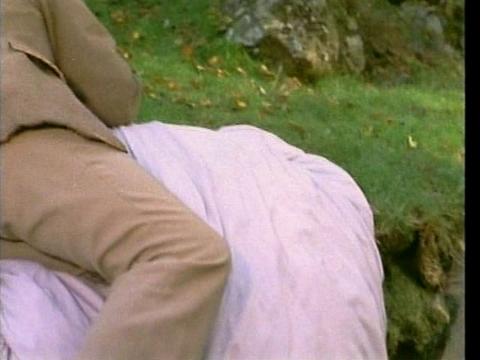
Phineas & Mary (Maire Ni Ghrainne) glimpsed
In the juxtaposed scene of staid married love (the Pallisers again at breakfast, but this time comfortably, he reading, she studying a list and plan for her first Friday reception since giving birth, Palliser objects, “So soon?,” and is told that Gerald was born “six months ago:” “you do not expect me to lie about sofas for the rest of my life.”
None of this language pattern is in Trollope; nor the sharp effective contrasts of color and ambience in the scenes. This imagery reflects the high passions, the high controlled surface culture of the wealthy, and the deadly frustrations just beneath. We have three gloriously beautiful, sunlit pastoral-erotic picturesque landscape: two of Phineas after Violet: Violet & Phineas on top of Loughlinter (see above), and the picturesque erotic pastoral of them in front of the house looked down upon by an aunt in a window:
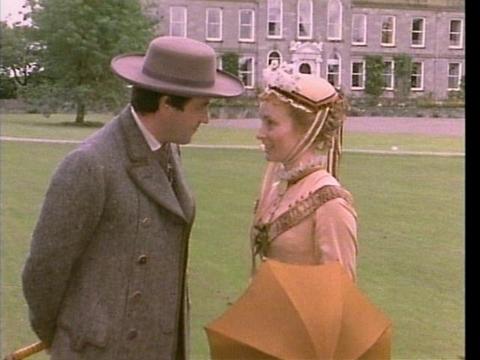
Phineas and Violet now in front of Saulsby
and one where he has sex with Mary Flood Jones (see above); these are juxtaposed to the dark sombre ones (1:2, Erle [Moray Watson], Lady Glen and Pallisers inside Kennedy’s house); Phineas in a dark car of a train speeding towards his campaign work reading Laura’s letter to him (a rare voice-over scene in the series); the black, bleak and death-in-life scenes of the Kennedy couple (Lady Laura: “I feel imprisoned here”):
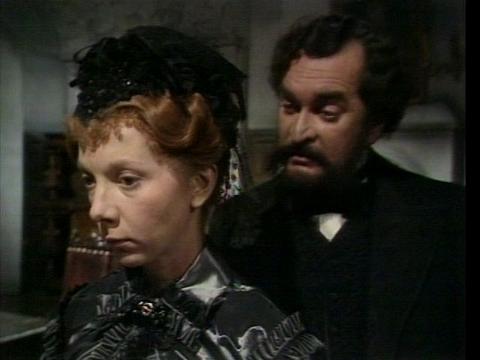
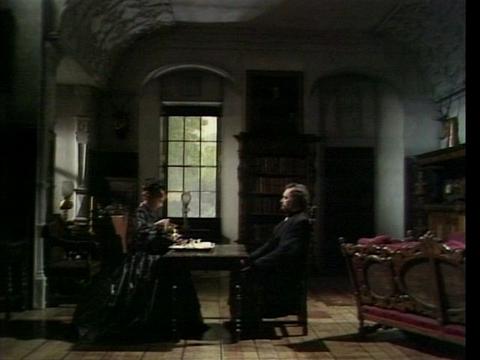
In general sombre colors dominate this part. Phineas vacillates between the sombre, distressed, and earnest idealist:
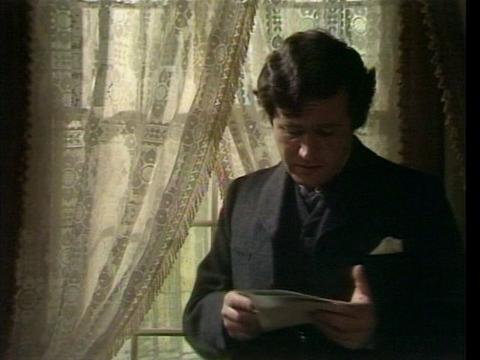
Phineas writing his open letter to Chiltern
and the predatory male, harassed by predatory others as well as time:
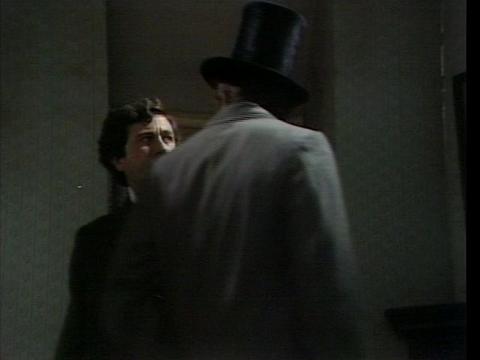
Chiltern (John Hallam) threatening, bullying Phineas in response
The urgency of time becomes more intense in Episode 5, the final one of the part (“At Odds”), as Slide comes to threaten Phineas that he will expose him as he is looking to stand for the next election at Brentford, Chiltern (John Hallam) comes to challenge Phineas to a duel pronto (as soon as Chiltern got Phineas’ letter which it irritates Chiltern to know was sitting in a postal place for months Chiltern rushes over to “bully” Phineas by threatened murder. And finally in the closing reception party, although at moments we watch Phineas waiting intensely for his chosen second, Fitzgibbon, when Fitzgibbon does, the moment comes unexpectedly and is felt as a most unwanted demand: Fitzgibbon, all apparent smiles, puts his hand on Phineas’ shoulder from Phineas’ back, interrupting him and saying peremptorily, “Come along, old fellow … time to go …”
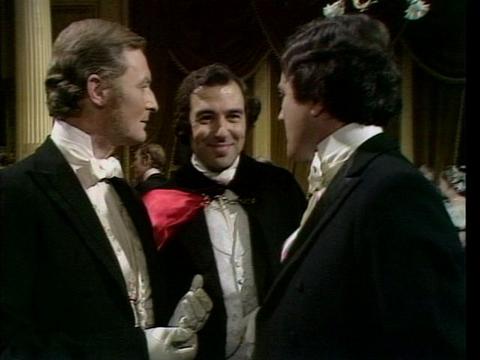
Phineas Finn called away by Laurence Fitzgibbon (Neil Stacey), Dolly Longstaffe (Donald Pickering) standing by
Tomorrow a thematic summary.
Sylvia
--
Posted by: Ellen
* * *
Comment
- From Trollope-l: expatiation:
One of the many powerful scenes in Pallisers 5:9 is the capital comic once where Aspasia Fitzgibbon (played with panache by Rosalind Knight) makes her first (and perhaps only) appearance in the series, and pays off Mr Clarkson’s (Sidney Bromley’s) bill on behalf of the helpless (because he doesn’t begin to have such a sum, although he is daily with people for whom such a sum is pocketchange) Phineas Finn. I’ve taken the moment where she sits down to pour tea for herself and Mr Clarkson; they appear to know each other very well indeed:
The part is dominated by women (as was 2:2, Coercion and Pursuit), and contains little of general money, land and voting politics; the politics might be said to be sexual, only they are not seen as politics but rather psychological depictions of the struggles and suffering women Phineas is involved with undergo because of their position in society, decisions imposed on or made by themselves; their own ways of coping with life: his friends, lovers, supporters (you could place Lady Glen here), and his friend’s sister. So 4:8 was heavily politics, and 5:9 is heavily love stories.
The miseries of women are before us in most of these: Lady Laura controlled, harassed, berated, and now punished by her husband who she has grown to loathe so she will not go to bed with him, so he now pursues her father and brother for an enormous sum of dowry as retaliation for her not doing her duty; Lady Glen in a remarkable sudden reversion to the Lady Glen of the early part of the series: when Palliser attempts in his stiff-necked mortification and jealousy to stop her playing on the floor with her son, bullies her, she bursts out she would not be with him but because it was her duty to be his breed cow, and asserts again they do not love one another; she retracts it but she did say it because it has fundamental truth if you replace love with compatibility, congeniality, individual fulfillment and understanding;
Violet Effingham is now pursued by Phineas (who behaves like a philandering pressuring seeker of money and position or sex through women in this episode) and Chiltern, hamstrung by an aunt. Violet is not suffering and the problem she has is what decision shall she make to have a life when the man she could love is a bully, a wild gambler, violent and one who is willing to kill off any rivals (Chiltern challenges Phineas and insists Phineas meet him). Mary Flood is not suffering but we see her allow Phineas to have full sexual intercourse with her (suggested by the scene) in order probably to hold him to her, to make him somehow hers she hopes, all the while he is prepared to go off and seek Violet again.
The one woman who seems free is Madame Max, but she is not as free as she seems. She is playing a guarded performative part (especially with the Duke and partly with Phineas who does not see how she likes him). She is (as Lady Glen discerns) a lonely woman. We see her first meeting with Palliser who is coaxed by his wife, Lady Glen, to invite Madame Max and this time be friendly to her; she evinces courtesy and an interest and understanding of a decimal system, and we are reminded of how much he appreciated Griselda, Lady Dumbello’s similarly evinced interest, only in her case it is more disinterested and she is not asking anything but his countenance, companionship. This is what she tells the Duke: she wants only his company. She does have a line whose image reverberates in the dialogue of the part: she tells Mr Finn when he says he is running out of time: “time is pressing us all very hard.” Time pressed Phineas hard with Clarkson and Aspasia saved the day; Lady Glen’s enormous pregnancy and danger in childbirth (this time slightly acknowledged) presses her; time presses Phineas hard when Chiltern chases him and Fitzgibbon as his second (they become friends again, sort of, when
the bill is paid and Fitzgibbon comes to apologize and say he will not ask for money again—it would be useless), time has ruined Lady Laura. In each of the dialogues the word is used too so Raven is aware of this.
This is the first Part I’ve noticed where a thread of imagery is original with Raven and pertinent. Trollope named his unmarried sharp intelligent strong woman after a famous learned woman in Greek history whose name then was turned to sexual uses (as a woman exploited and harassed into rape by brothers at court) in Jacobean plays, and who is now one of Judy Chicago’s 39 at her dinner party. Raven kept this suggestive name; he does make explicit that the woman is the way she is because she’s unmarried and that is feeding into anti-woman ideas, but he makes her so inimitable one can nearly forget it.
The scene with Clarkson does not occur in the novel; in fact most of the scenes in this part do not occur in the novel though lines are taken from the novel. They are many of them magnificent and the Part certainly testifies to the greatness of the intermediate film adaptation (analogous and only critically faithful, the commentary).
E.M.
— Elinor Mar 11, 6:10am #
commenting closed for this article
